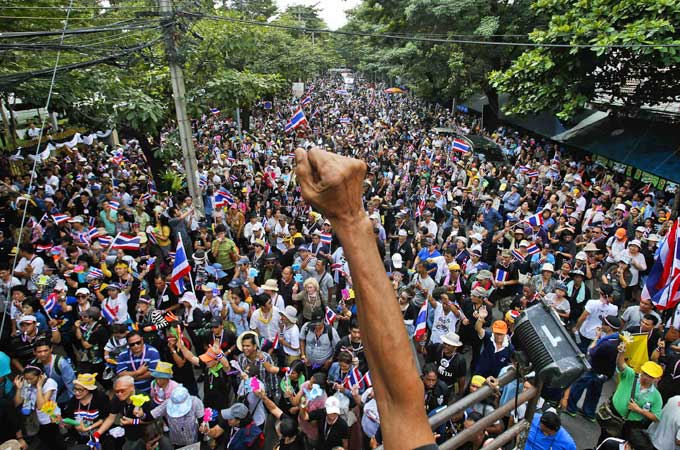Thai prime minister survives confidence vote
Yingluck Shinawatra called on protesters to end largest anti-government demonstrations since 2010.

Yingluck Shinawatra, Thailand’s prime minister, has survived a no-confidence vote in parliament where her party holds a commanding majority, but faces mounting pressure from widening anti-government protests.
Hours later, she appealed to protesters to end their sit-ins at ministry buildings across the capital, Bangkok.
The vote is unlikely to defuse tensions or end the biggest anti-government protests since deadly political unrest three years ago. Protesters made a brief demonstration outside the defence ministry later on Thursday.
“I will not dissolve the house,” a defiant Yingluck said before Thursday’s vote.
“It is clear the protesters are not looking for house dissolution so, starting today, let us find a way out this together.”
|
|
| Thailand protests: Then and now |
In recent days, thousands of Thai protesters massed outside four ministries, a major government office complex and more than a dozen provincial halls in an escalation of their efforts to topple Yingluck.
The Department of Special Investigation (DSI) was evacuated on Wednesday as about 2,000 protesters gathered outside, rallying against Yingluck and her influential brother and former prime minister Thaksin Shinawatra.
Al Jazeera’s Florence Looi, reporting from Bangkok, said that the Chinese ambassador had offered to mediate between the two sides.
“But it is doubtful that protesters will sit down to negotiate – they want the government out,” she said.
Sean Boonpracong, Thailand’s national security adviser, played down the immediate impact of the protests.
“The business of government is going on as usual,” he told Al Jazeera.
“The prime minister wants the protesters to come in and talk, and we have to be slightly patient. I’m sure the economic impact will be quite substantial if they do not come in to talks.”
Services disrupted
Sean Boonpracong said the disruption of key services in the capital was unnecessary, given that elections are due in 2015.
“The protesters could vote us out in two years, and that is the normal way of things,” he said.
“They can take us down … they have to have good policies.”
 |
| Thousands of opposition supporters have targeted government offices in Bangkok in recent days [Reuters] |
Boonpracong said the government wanted to arrest the organisers of the demonstrations, but not the masses who were taking part.
“Authorities seem keen to avoid confrontation that could turn violence,” said our correspondent.
Suthep Thaugsuban, the protest leader and a former deputy prime minister, said protesters remained “very upbeat”.
“If we demolish the Thaksin regime… we will set up a people’s council, which will come from people from every sector,” he said.
“Then we will let the people’s council pick good people to be the prime minister and ministers.”
Anti-government protesters chanted abuse at the DSI as scores of riot police scrambled to put on helmets and hold up shields, with crowds pushing against a low fence.
The DSI, located in a complex of key government offices, recently indicted Thaugsuban for his alleged role in the deaths of more than 90 people in a 2010 military crackdown targeting supporters of Thaksin.
Thaksin was deposed in a 2006 military coup and fled the country to avoid a two-year prison term on a corruption conviction. He continues to sharply divide the nation, with his supporters and opponents battling for power.